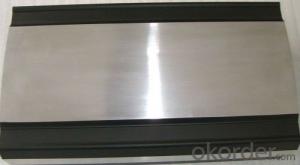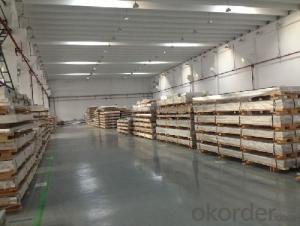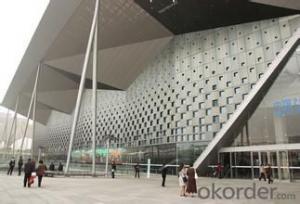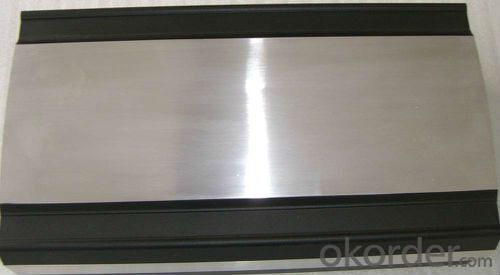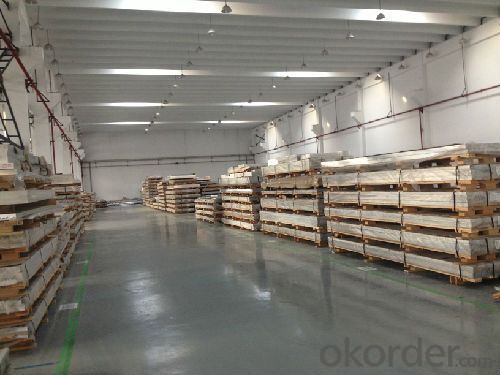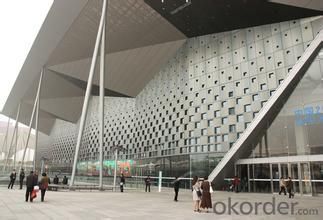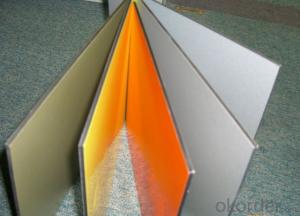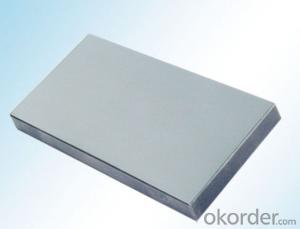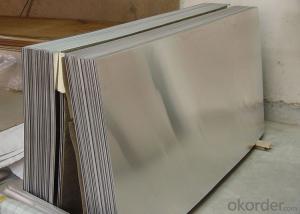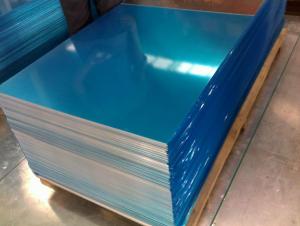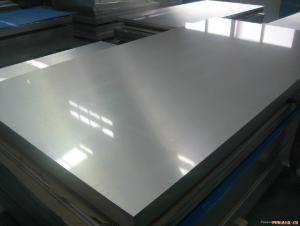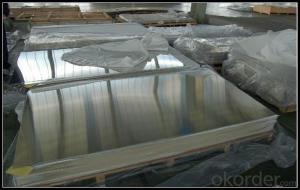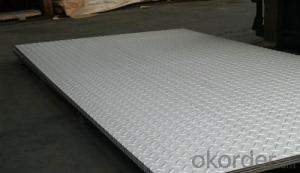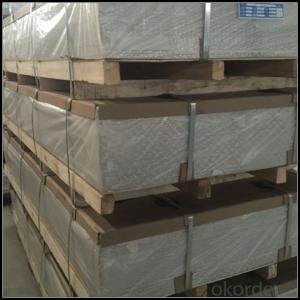Series 5 Aluminum Hydroxide Sheets for Track Transportation
- Loading Port:
- Shanghai
- Payment Terms:
- TT OR LC
- Min Order Qty:
- 5 m.t.
- Supply Capability:
- 9000 m.t./month
OKorder Service Pledge
OKorder Financial Service
You Might Also Like
Specification
1. Specification
| Alloy | Temper | Gauge(mm) | ||
5000 series
| H32/H34/H116/H321H113/O/T4/T6/T651 | Thickness | Width | Length |
| 0.2-80 | 1000-2600 | 1000-16500 | ||
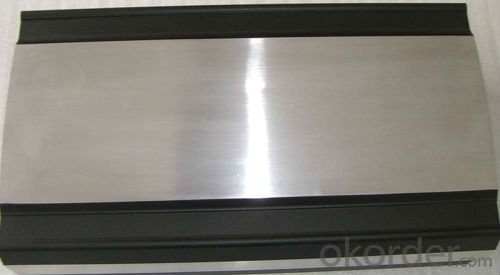
2. Production Feature
Wide,produced by widest 1+4 hot rolling line in China
Long, performance sustainable even after forming
Rust & erosion resistant
Well shaped,
Good surface
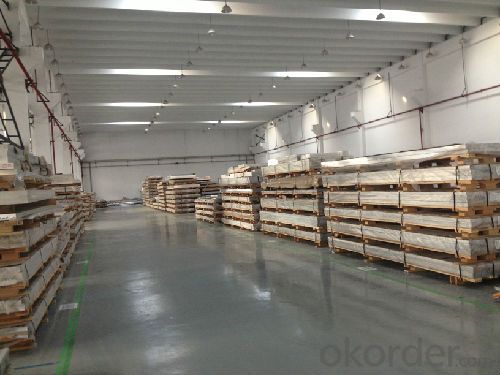
3. Packing & Shipping
Wooden pallet and steel band packing
Eye to sky & eye to wall
Shipped in 20ft & 40ft containers
4. Product Standard
ASTM- B 209
EN485
GB3880.3-2012
JIS4000
5. Application
Products are widely used in wide range transportation, packing & printing, mechanical manufacturing, electronic communication, hardware molding, architectural decoration and etc.
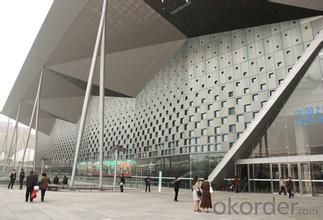
- Q: Are aluminum sheets suitable for electrical busbars?
- Electrical busbars can indeed be made from aluminum sheets. Aluminum is extensively used in the electrical industry due to its exceptional electrical conductivity, lightweight properties, and affordability in comparison to metals like copper. Aluminum sheets can be easily shaped and sized to fit the required dimensions for busbars, making them a versatile choice for electrical applications. Moreover, aluminum possesses commendable thermal conductivity, aiding in the dissipation of heat generated during electrical operations. However, it is crucial to acknowledge that aluminum has a lower electrical conductivity than copper, necessitating larger cross-sectional areas to achieve equivalent electrical performance. Consequently, it is vital to consider the specific requirements of the electrical system and seek expert advice to determine the suitability of aluminum sheets for a particular busbar application.
- Q: what's the temperature tolerance of aluminum sheets?
- aluminum is a kind of silver white metal,melting point:660.4℃, boiling point: 2467℃,density: 2.70 g/cm?,very light, about 1/4 of iron's density.it has low hardness and good ductility, which makes it suitable for being pulled into threadlets or pressed into aluminum foils, and the later is usually used for packaging candy and cigarette. it has good electrical and temperature conductivity. it's used for the manufacture of electric wire and cable in electric power industry, and for the manufacture of cooker in daily life bined with the magnesium , copper,zinc,tin,manganese,chromium,zirconium,silicon and other elments,it can formulate various alloys that is broadly used for the manufacture of airplane,car,ship, materials of daily living equipment and the doors and windows of construction industry.aluminum is one of the best reflectors of heat and light, so it is used as thermal insulation material and the manufacture of reflecting mirror in the reflecting telescope.
- Q: This question asks for a comparison of the pros and cons of using aluminum sheets as a material for exterior walls in construction.
- <p>Aluminum sheets for exterior walls offer several advantages, including durability, low maintenance, and resistance to corrosion and weathering. They are lightweight, which can reduce the load on structures, and are recyclable, contributing to sustainability. Additionally, aluminum sheets can be easily shaped and painted, offering design flexibility. However, they have some disadvantages, such as being a poor insulator, which may require additional insulation for energy efficiency. They can also dent or scratch easily and may require more frequent replacement due to their lower resistance to impacts compared to materials like stone or brick. Furthermore, while they reflect heat well, they can also conduct cold, potentially leading to issues in extreme temperature conditions.</p>
- Q: Are aluminum sheets suitable for chemical processing applications?
- Yes, aluminum sheets are suitable for chemical processing applications. Aluminum is known for its excellent corrosion resistance, making it a popular choice in various chemical industries. It can withstand exposure to many chemicals, including acids, alkalis, and organic solvents. Additionally, aluminum sheets are lightweight, easy to work with, and offer good thermal conductivity, making them versatile and efficient for chemical processing applications.
- Q: This question asks about the various grades of aluminum sheets and the impact of these grades on their pricing.
- <p>Aluminum sheets are categorized into different grades based on their composition and properties. The most common grades include 1000 series (99% pure aluminum), 3000 series (aluminum-manganese alloys), 5000 series (aluminum-magnesium alloys), and 6000 series (aluminum-magnesium-silicate alloys). Each grade has unique characteristics affecting their applications, such as corrosion resistance, strength, and formability. The price of aluminum sheets varies with the grade due to differences in purity, alloying elements, production complexity, and market demand. Purity and the addition of alloying elements can increase the cost, while the availability and demand in the market also influence pricing. For instance, 1000 series sheets are generally cheaper due to their high purity and lack of alloying, while 6000 series sheets, known for their strength and durability, command a higher price.</p>
- Q: What are the weight-saving benefits of using aluminum sheets in different applications?
- There are several weight-saving benefits of using aluminum sheets in different applications. Firstly, aluminum is a lightweight metal, with a density much lower than other commonly used materials such as steel. This means that by replacing steel sheets with aluminum sheets, significant weight reduction can be achieved in various applications. The reduced weight of aluminum sheets is particularly advantageous in transportation industries. For example, in the automotive sector, using aluminum sheets for body panels, chassis components, and other structural parts can significantly lighten the vehicle's overall weight. This weight reduction leads to improved fuel efficiency, as less energy is required to move the lighter vehicle. Additionally, lighter vehicles generally have better acceleration, handling, and braking performance. In the aerospace industry, the weight-saving benefits of aluminum sheets are even more crucial. Every extra kilogram of weight on an aircraft can increase fuel consumption, and thus operating costs. By utilizing lightweight aluminum sheets in the construction of aircraft structures, such as wings, fuselages, and engine components, the overall weight of the aircraft can be reduced, resulting in improved fuel efficiency and extended flight range. Another industry where the weight-saving benefits of aluminum sheets are highly valued is the construction sector. Aluminum sheets are often used in the construction of buildings and infrastructure due to their lightweight nature. This lightweight characteristic not only makes installation easier but also reduces the overall load on the building's foundation. Moreover, using aluminum sheets in construction can also lead to cost savings, as lighter materials require less support structure and can be transported more efficiently. Furthermore, the weight-saving benefits of aluminum sheets extend to various other applications such as packaging, electronics, and consumer goods. In packaging, aluminum sheets are commonly used for lightweight and flexible packaging materials, reducing shipping costs and environmental impact. In electronics, aluminum sheets are used in devices like laptops and smartphones, where weight reduction is desirable for portability. Lastly, in consumer goods, aluminum sheets are utilized for producing lightweight and durable products, such as furniture, cookware, and sports equipment. In conclusion, the weight-saving benefits of using aluminum sheets in different applications are significant. The lightweight nature of aluminum allows for reduced weight in transportation industries, improved fuel efficiency, better performance, and extended flight range in aerospace applications, cost savings and easier installation in construction, as well as various advantages in packaging, electronics, and consumer goods. Overall, aluminum sheets offer a versatile and efficient solution for achieving weight reduction and enhancing performance in diverse industries.
- Q: To an idiot, this may seem like a stupid question: its just aluminum. But it may not be.However seeing that I am only a high school student and don't have access to aluminum power (which is what I desire for an independent experiment) so I'd like to grind consumer grade aluminum foil down bases of Mohs scale of Hardness.My concern is that aluminum foil is Aluminum oxide which is a 9 (10 being diamond, 1 being talcum powder) and this would be horribly difficult to grind.If it is Alumina, that's only a 3.5.If it does happen to be aluminum oxide, can you think of a way to remove the Oxygen. Would nitric acid work.
- Thermite or meth?
- Q: Are aluminum sheets easy to clean?
- Yes, aluminum sheets are generally easy to clean. Aluminum is a non-porous material, which means that it does not absorb liquids or stains easily. This makes it relatively easy to wipe off dirt, dust, or spills from the surface of aluminum sheets using a damp cloth or sponge. Additionally, aluminum is resistant to rust and corrosion, so it does not require any special cleaning agents or treatments. However, it is important to note that abrasive cleaners or scrubbing pads should be avoided as they can scratch the surface of the aluminum. Overall, with regular maintenance and proper cleaning techniques, aluminum sheets can be kept clean and in good condition for a long time.
- Q: Can the aluminum sheets be used for manufacturing solar panel frames?
- Indeed, solar panel frames can be manufactured using aluminum sheets. The solar industry frequently employs aluminum due to its lightweight nature, durability, and ability to resist corrosion. When it comes to solar panel frames, aluminum proves to be an excellent selection as it offers structural support and can endure diverse weather conditions. Moreover, aluminum is easily recyclable, thereby presenting an environmentally conscious choice for solar panel manufacturers. All in all, aluminum sheets are a fitting material for the production of solar panel frames.
- Q: Are 101 aluminum sheets suitable for medical equipment?
- 101 aluminum sheets are not suitable for medical equipment. They lack the necessary characteristics such as durability, corrosion-resistance, and biocompatibility. Despite being a strong and versatile alloy, 101 aluminum does not meet the standards for medical equipment. Instead, manufacturers in the medical industry prefer specialized alloys like stainless steel or titanium. These alloys offer superior strength, corrosion-resistance, and compatibility with the human body. To ensure the safety and effectiveness of medical equipment, it is crucial to choose materials that meet the specific requirements of the healthcare industry.
Send your message to us
Series 5 Aluminum Hydroxide Sheets for Track Transportation
- Loading Port:
- Shanghai
- Payment Terms:
- TT OR LC
- Min Order Qty:
- 5 m.t.
- Supply Capability:
- 9000 m.t./month
OKorder Service Pledge
OKorder Financial Service
Similar products
Hot products
Hot Searches
Related keywords
